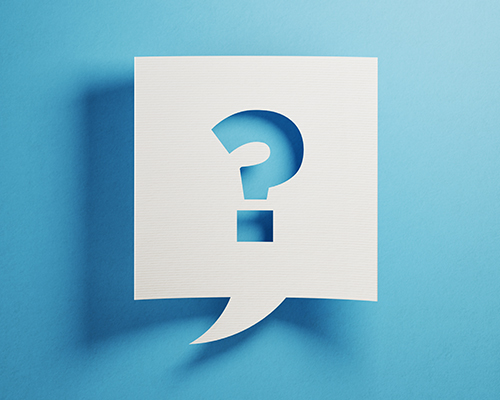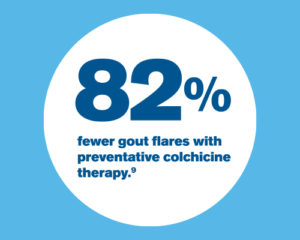
Gout is a form of inflammatory arthritis that affects more than eight million people in the US.1 Those who suffer with the disease sometimes experience sudden, intensely painful attacks called flares.2 However, a prescription medication called may be able to prevent these episodes.3 Read on for answers to frequently asked questions about colchicine.
What is colchicine?
Colchicine, which comes from a flower called the autumn crocus (Colchicum autumnale), is one of the most frequently used drugs for preventing the inflammation associated with acute gout.4 It is one of the oldest as well.5 There is evidence that colchicine was used in ancient Greece more than 2000 years ago.5
How does colchicine help prevent gout flares?
When urate crystals form in the joints, the body can respond as if they are a foreign substance or bacteria.6 When this happens, white blood cells and other infection fighters race to the area.6 This immune response causes the sudden redness, swelling and intense pain of a gout flare.6 It is believed that colchicine helps to prevent gout flares by reducing the intensity of this response.3,4,7
Why should I consider colchicine?
It is important to take preventive measures to stop flares before they happen,8 and colchicine has been proven to reduce the risk of gout flares.9 Without medication, your risk of flares increases greatly over time.10 Including colchicine in your flare prevention regimen may help reduce this risk.9
In a six-month study, adults who took colchicine 0.6 mg daily had 82 percent fewer gout flares.9

In this study, 43 patients starting allopurinol were randomized to receive colchicine 0.6 mg or placebo for up to six months.9 Over the study period, the mean number of gout attacks in patients receiving colchicine plus allopurinol was 0.52, compared with 2.91 gout attacks among patients receiving placebo.9
Do I need a prescription to buy colchicine?
Yes. Colchicine is available only by prescription.7,11
When should I start taking colchicine?
The American College of Rheumatology (ACR) Guidelines for Management of Gout state that patients should start taking an anti-inflammatory medicine such as colchicine either right before or when they begin treatment with a urate-lowering therapy (ULT).12
How much colchicine should I take to prevent gout flares?
The appropriate colchicine dosage for the prevention of gout flares in adults is 0.6 mg, taken once or twice a day.7 The maximum colchicine dosage is 1.2 mg per day.7
For how long should I take colchicine?
Take colchicine exactly as directed and for as long as your healthcare professional tells you to.
Does colchicine work the same way as other pain relievers?
No. Colchicine is a very specific kind of pain reliever and will not ease most kinds of pain.7,11 Use colchicine only as directed.7,11
How can I save money on colchicine?
With the True Blue Savings Card, available from Hikma Pharmaceuticals USA Inc., eligible patients can receive their first fill of Mitigare® (Colchicine) 0.6 mg Capsules or Authorized Generic Colchicine 0.6 mg Capsules for as little as $0, up to a maximum value of $65. For refills, eligible patients can save on their out-of-pocket costs and pay as little as $5 per refill for their Mitigare® or Generic Colchicine Capsules, up to a maximum value of $50 per 30-day supply (up to a maximum of 60 capsules).*
Dispenses for 60-day supply (up to a maximum of 120 capsules) and 90-day supply (up to a maximum of 180 capsules) are permissible within the terms of the program, up to a total of a 12-month supply.
Find out if you are eligible for True Blue Savings now.
*For all eligible patients 18 years or older who are legal residents of the United States or Puerto Rico. First 30 days are as little as $0 only for eligible patients. Maximum savings of $65 on the first fill and $50 on refills. Please see complete Terms and Conditions available at Mitigare.com.
Important Safety Information
Colchicine 0.6 mg capsules are contraindicated in patients with renal or hepatic impairment who are currently prescribed drugs that inhibit both P-gp and CYP3A4. Combining these dual inhibitors with colchicine in patients with renal or hepatic impairment has resulted in life-threatening or fatal colchicine toxicity. Patients with both renal and hepatic impairment should not be given Mitigare®.
Fatal overdoses have been reported with colchicine in adults and children. Keep Mitigare® out of the reach of children.
Blood dyscrasias such as myelosuppression, leukopenia, granulocytopenia, thrombocytopenia, and aplastic anemia have been reported with colchicine used in therapeutic doses.
Monitor for toxicity and if present consider temporary interruption or discontinuation of colchicine.
Drug interaction with dual P-gp and CYP3A4 inhibitors: Co-administration of colchicine with dual P-gp and CYP3A4 inhibitors has resulted in life-threatening interactions and death.
Neuromuscular toxicity and rhabdomyolysis may occur with chronic treatment with colchicine in therapeutic doses, especially in combination with other drugs known to cause this effect. Patients with impaired renal function and elderly patients (including those with normal renal and hepatic function) are at increased risk. Consider temporary interruption or discontinuation of Mitigare®.
Please see the full Prescribing Information and Medication Guide for Mitigare® for complete product details.
NOTE: This article was not written by a medical professional and is not intended to substitute for the guidance of a physician. These are not Hikma’s recommendations for gout flare prevention, but rather facts and data collected from various reliable medical sources. For a full list of resources and their attributing links, see below.
